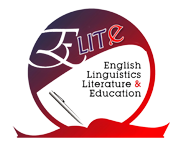An Examination of Parental Engagement in Young Learner EFL Literacy Development
 Abstract views: 192
,
Abstract views: 192
,
 PDF downloads: 178
PDF downloads: 178
Abstract
Abstract: This study examines a home reading and writing practices of a family in Balongpanggang, Gresik. Researcher uses a qualitative approach. The ORIM frame work permits us to look at this engagement. From this think about of this families, it is evident that family tend to recognize his/her children's new-to-her EFL scholarly improvement. In spite of the fact that there are diverse engagement strategies such as considering diverse choices, appearing appreciation, interfacing with children, and taking portion in exhibitions. The survey results and parent interviews revealed how parents perceive their involvement in the EFL development of young learners and how they are involved in the development of young learners' EFL literacy. It is utilized to depict whether Analysts found that whereas families see their child's developing proficiency hones more customarily, they still provide opportunities,, recognize their development, interact with them, and improve the child's EFL literacy. Found that it served as a role model for the learning of Recognition of these family engagement strategies highlighted the complexity of the literacy process and emphasized the importance of the whole family in helping the young learner develop her EFL literacy skills.
Downloads
References
Al-Qaryouti, I. A., & Kilani, H. A. (2013). Role of Omani parents: Fostering emergent literacy skills. Education 3-13, 43(3), 336–348. https://doi.org/10.1080/03004279.2013.815248
Aram, D., Korat, O., & Hassunah-Arafat, S. (2013). The contribution of early home literacy activities to first grade reading and writing achievements in Arabic. Reading and Writing, 26(9), 1517–1536. https://doi.org/10.1007/s11145-013-9430-y
Arthur, L & Makin, L. (2001). High quality early literacy programs. Australian Journal of Early Childhood, 14–19.
Berns. (2016). Child, family, school, community: Socialisation and support (10th ed.). Cengage.
Blake, D. & Hanley. (1995). Dictionary of Educational Terms. Aldershot, Arena.
bong. (2008). Effects of Parent-child Relationships and Classroom Goals.
Clay, M. (1966). Emergent Reading Behavior. University of Auckland.
Cummings, K. P., Hardin, B. J. (2017). Parents’ Roles in Early Children’s Literacy Development. Framing the Future: Revisiting the Place of Educational Expectations in Status Attainment. Social Forces.
Desforges, C., & Abouchaar, A. (2003). The Impact Of Parental Involvement, Parental Support And Family Education On Pupil Achievement And Adjustment: A literature review. DfES.
Doyle, A. (2012). Family Literacy Programs: Where Have They Come from and Where Are They Going? Frontiers of Education in China, 7(1), 85–102. https://doi.org/10.1007/BF03396936
Edwards, PA. (2004). Children’s Literacy Development: Making It Happen Through School, Family, And Community Involvement. Pearson Education Incorporated.
Grant, K. B., Golden, S. E., & Wilson, N. S. (2014). Literacy Assessment and Instructional Strategies: Connecting to the Common Core. In Students Who Struggle With Literacy Learning. Thousand Oaks: Sage Publications.
Hannon, P & Bird, V. (2004). Family Literacy in England: Theory, practice, research, and policy, In Handbook of family literacy. New Jersey.
Hopkins, K. (2003). The Evaluation Of A Family Literacy Program [Master of Science, Louisiana State University and Agricultural and Mechanical College]. https://doi.org/10.31390/gradschool_theses.3500
Inglis, F. and Aers, L. (2008). Key Concept In Education. SAGE Publications Ltd.
Kassow, D. (2006). Environmental print awareness in young children. Talaris Research Institute.
Lawton & gordon. (1996). Dictionary of Education. London, Hodder, and Stoughton.
Lonigan, CJ. (2004). ). Emergent Literacy Skills And Family Literacy, In: Handbook of family literacy (1st edition). Routledge.
Mandela, N. (1994). Long Walk to Freedom: The Autobiography of Nelson Mandela. Little Brown & Co.
Marsh, J., Hannon, P., Lewis, M., & Ritchie,. (2015). ). Young Children’s Initiation Into Family Literacy Practices In The Digital Age. Journal of Early Childhood Research, 1–14.
Neaum, S. (2012). Language And Literacy For The Early Years. Sage Publications.
Ntuli, D & Pretorius, EJ. (2005). Laying Foundations For Academic Language Competence: The Effects Of Storybook Reading On Zulu Language, Literacy, And Discourse Development. Southern African Linguistics And Applied Language Studies. 91–109.
Nutbrown, C, Hannon, P & Morgan, A. (2005). Early Literacy Work With Families: Policy, Practice, And Research.
Pretorius, E & Machet, MP. (2008). The impact of storybook reading on emergent literacy: Evidence from poor rural areas in KwaZulu-Natal, South Africa. Mousaion Special Issue, 261–289.
Purcell-Gates, V. (2004). Family literacy as the site for emerging knowledge of the written language, In Handbook of family literacy, edited by Wasik, BH. Lawrence Erlbaum Associates.
Wasik, BH & Hermann, S. (2004). Family literacy: History, concepts, services, In Handbook of family literacy (1st Edition). Routledge.
Whitehurst, G. J., & Lonigan, C. J. (2001). Emergent Literacy: Development From Prereaders To Readers. The Guilford Press.
Yang, H.-C., & Noel, A. M. (2006). The developmental characteristics of four- and five-year-old pre-schoolers’ drawing: An analysis of scribbles, placement patterns, emergent writing, and name writing in archived spontaneous drawing samples. Journal of Early Childhood Literacy, 6(2), 145–162. https://doi.org/10.1177/1468798406066442
The journal uses an Open Access policy under a Creative Commons Attribution-NonCommercial 4.0 International License. Authors who publish with this journal agree to the following terms:
- Authors retain copyright and grant the journal right of first publication with the work simultaneously licensed under a Creative Commons Attribution License that allows others to share the work with an acknowledgment of the work's authorship and initial publication in this journal.
- Authors are able to enter into separate, additional contractual arrangements for the non-exclusive distribution of the journal's published version of the work (e.g., post it to an institutional repository or publish it in a book), with an acknowledgment of its initial publication in this journal.
- Authors are permitted and encouraged to post their work online (e.g., in institutional repositories or on their website) prior to and during the submission process, as it can lead to productive exchanges, as well as earlier and greater citation of published work.
















